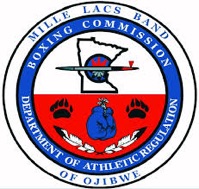

Ojibwe boxers in Minnesota have left a long and distinguished legacy in the sport. The names Little Wolf, Bellanger, Sergeant, Papasadora and numerous others were familiar to any Minnesotan who followed Golden Gloves beginning in the 1950s, through the 1970s and beyond.
The Mille Lacs band has picked up that legacy and began building on it a decade ago with the addition of professional boxing at its Grand Casino Hinckley. Already staging amateur shows including the Upper Midwest Golden Gloves tournaments, the band elected to add the professional element, keeping the sport alive at a time fight shows in the Twin Cities and throughout the rest of the state had diminished considerably.
The first citizens of the state had adopted boxing into their culture long ago and have staged regular amateur shows in the various Anishinaabe communities for decades, but it is at Grand Casino Mille Lacs where professional boxing has been given new life, thanks to a commitment from the Mille Lacs Band of Ojibwe Department of Athletic Regulation.
The band called upon Jim Erickson in 2007 to become executive director of the department and by 2008 he was in place and overseeing numerous aspects of professional boxing. “They already had a commission in place when I came on,’’ Erickson recalled.
“Harry Davis was one of our elected officials and had gone to the (tribal) legislative attorney to get direction on setting up our own boxing commis- sion,’’ Erickson added. “They did some research and also visited the Mohican Sun (Casino) and others to find out how they did it. Then the Mille Lacs band passed the legislation to put it in place.’’
Davis had already gotten the Upper Midwest and other Golden Gloves tournaments started, including a World tournament that involved the band and Puerto Rico.
Erickson previously coached amateur boxers in Williston, N.D. He had been a boxer himself and was active when Virgil Hill, who later became a world light heavyweight champion, was fighting as an amateur and won spots in the Upper Midwest tournament, winning Golden Gloves titles in Minneapolis. Erickson was a commissioner in North Dakota for 18 years.
Amateur boxing was already established and running at Grand Casino when Erickson arrived, so it was up to him to put the elements of profes- sional boxing in place. That he did, but not without plenty of assistance from others in the depart- ment, chairman Wally St. John among them.
The athletic department not only put together shows at its Hinckley casino, but used its expertise to help tribal casinos at various locations in the country learn the procedures necessary to stage boxing shows of their own.
When Erickson moved on to another similar position in Texas two years ago, Matt Roberson of the Wichita tribe was called upon in Oklahoma to take over assignment for the Mille Lacs band.
He has adjusted well to the new opportunity, with one understandable exception. “The winters are a little tough,’’ he said.
Yet, he says the boxing in Minnesota is a consid- erable improvement over the situation he left behind. “”It’s heads and tails above it,’’ he said. “Boxing there is a step above toughman.’’
The Mille Lacs Band of Ojibwe and its Department of Athletic Regulation have played a significant role in the process that has made that possible
in Minnesota, and the state’s Boxing Hall of Fame honors them for that significant and much needed contribution.








